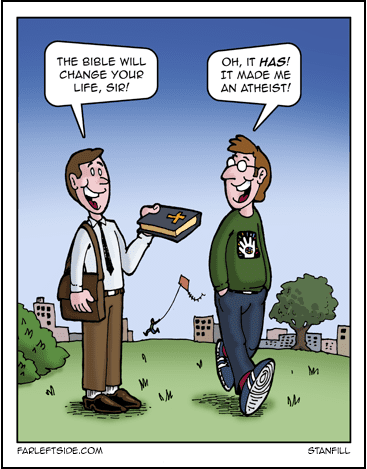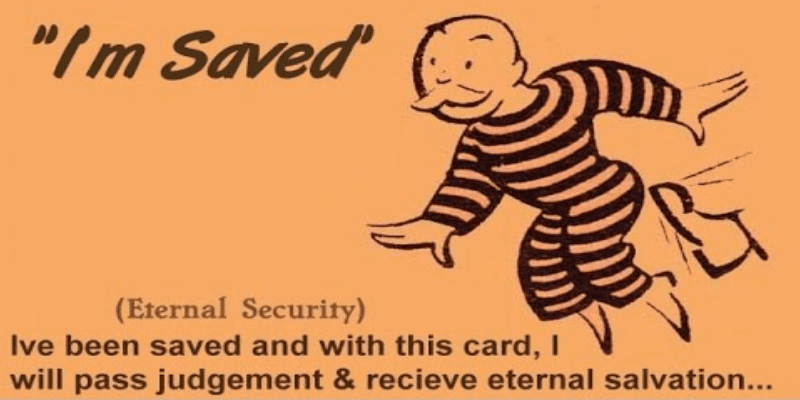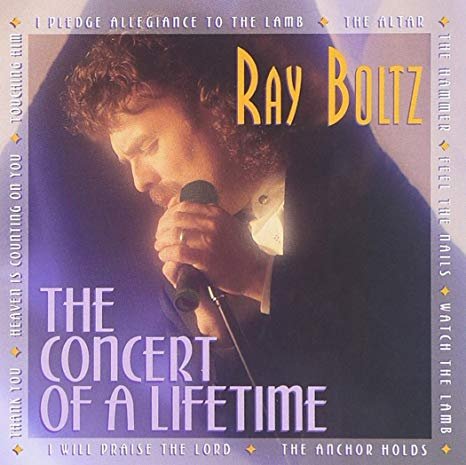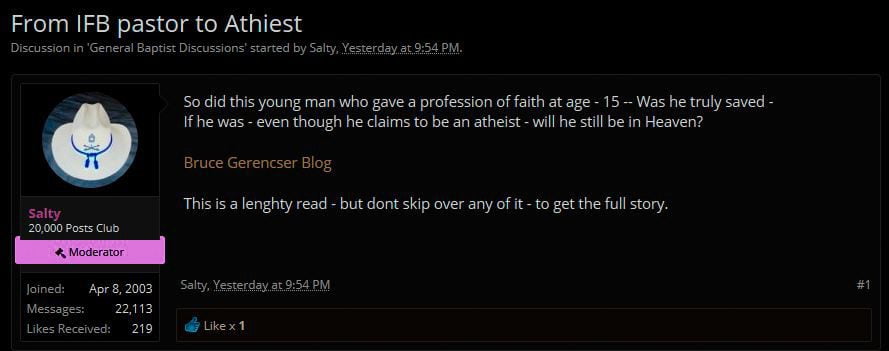
Bob, a regular reader of this site, asked me the following question:
I do have a question for you and was curious on your answer.I know you know the scriptures as far as what they say, so you will most likely have an answer.
Based on the scriptures concerning blasphemy it is my understanding from past teachings that blasphemy definition by Pharisee’s was saying that a person could forgive sins or someone claiming to be God. Jesus then talked about blasphemy against the Holy Spirit and no forgiveness.
Based on these few scriptures, in your opinion from what you know of your past Bible teachings, do you think that you have blasphemed against the Holy Spirit? Not because of your walking away, but rather by the things that you have said? I am asking based on your knowledge of what the Bible says, not whether you believe in the Bible today.
Hopefully I have worded this respectfully enough for an answer.
Wonderful question. Hopefully, I can provide an adequate and satisfactory answer.
And the scribes which came down from Jerusalem said, He hath Beelzebub, and by the prince of the devils casteth he out devils. And he called them unto him, and said unto them in parables, How can Satan cast out Satan? And if a kingdom be divided against itself, that kingdom cannot stand. And if a house be divided against itself, that house cannot stand. And if Satan rise up against himself, and be divided, he cannot stand, but hath an end. No man can enter into a strong man’s house, and spoil his goods, except he will first bind the strong man; and then he will spoil his house. Verily I say unto you, All sins shall be forgiven unto the sons of men, and blasphemies wherewith soever they shall blaspheme: But he that shall blaspheme against the Holy Ghost hath never forgiveness, but is in danger of eternal damnation. Because they said, He hath an unclean spirit.
Ligonier Ministries, the teaching ministry of Reformed Evangelical R.C. Sproul, interprets Mark 3:28-30 this way:
Although Jesus does not specifically define this sin, the context reveals this transgression as the persistent, knowing, verbal attribution of the work of God to Satan.
First, Mark’s comment “for they were saying” (v. 30) as he narrates Jesus’ response to the scribes shows that the blasphemy Jesus has in mind is a verbal sin. The scribes were sinning with words, with statements against our Savior. Moreover, the same comment from Mark means unforgivable blasphemy is a persistent sin. “Were saying” is in the progressive voice, which conveys ongoing action. The scribes spoke against Jesus not merely one time; rather, they were so hardened against Him that they continued to associate Him with Satan.
Such hardness is particularly noteworthy because it came from the resident biblical experts. So, we cannot understand what Jesus means by the blasphemy against the Holy Spirit unless we recognize the scriptural knowledge of our Lord’s opponents. Throughout His earthly ministry, Jesus held the religious leaders to a high standard. Christ expected them to know the Hebrew Scriptures, or Old Testament, so well that they could rightly identify God’s work (Matt. 23; John 3:1–15). So, the blasphemy of the Spirit does not arise from mere ignorance. When people know the Scriptures well and yet not only fail to recognize Jesus as Messiah but also openly reject Him, they are standing on perilous ground.
Blasphemy of the Spirit, then, is not the occasional bad thought or episode of anger against God. Such things are sins, to be sure, but they are not the persistent, deliberate rejection of the Lord’s work that shows itself in a willful attribution of God’s actions to Satan himself. Such blasphemy is unforgivable not because the Lord is unwilling to forgive but because a person guilty of such sin has fully and finally hardened his heart against the grace of God.
What, exactly, is the unpardonable sin? While Evangelicals disagree among themselves about the unpardonable sin — what it is and who can commit it — Sproul’s interpretation is held by many Christians. As an Evangelical pastor, my interpretation aligned with Sproul’s; that the unpardonable sin is ascribing the works of God (Jesus) to Satan; that those who commit the unpardonable sin cannot be saved/redeemed.
Bob wants to know, based on my knowledge of the Bible, if I believe I have committed the unpardonable sin? The short answer is no. While I certainly, with great gusto, blaspheme God, the Father, God, the Son, and God, the Holy Spirit, I have never ascribed the works of God to Satan. The reason for this is simple: much like God himself, I believe Satan is a myth. It would be silly of me, then, to give credit to Satan for works allegedly performed by God.
The “works of God,” without exception, are the handiwork of humans, as are works ascribed to Satan. Gods, regardless of the sect, are fabricated by humans, and the only “powers” deities have are those which we give to them.
Now, if I transport this discussion back to the days when I was an Independent Fundamentalist Baptist (IFB) pastor, and I had run-in with Bruce Gerencser, the atheist, I most certainly would have said that he was a blasphemer against God; that he had committed the unpardonable sin.
Having said that, the notion that there is an “unpardonable sin” leads to all sorts of problems theologically for Evangelicals.
Is there a difference between the “unpardonable sin” and reprobation, as found in Romans 1:18-32?
For the wrath of God is revealed from heaven against all ungodliness and unrighteousness of men, who hold the truth in unrighteousness;
Because that which may be known of God is manifest in them; for God hath shewed it unto them.
For the invisible things of him from the creation of the world are clearly seen, being understood by the things that are made, even his eternal power and Godhead; so that they are without excuse:
Because that, when they knew God, they glorified him not as God, neither were thankful; but became vain in their imaginations, and their foolish heart was darkened.
Professing themselves to be wise, they became fools, And changed the glory of the uncorruptible God into an image made like to corruptible man, and to birds, and fourfooted beasts, and creeping things.
Wherefore God also gave them up to uncleanness through the lusts of their own hearts, to dishonour their own bodies between themselves:
Who changed the truth of God into a lie, and worshipped and served the creature more than the Creator, who is blessed for ever. Amen. For this cause God gave them up unto vile affections: for even their women did change the natural use into that which is against nature:
And likewise also the men, leaving the natural use of the woman, burned in their lust one toward another; men with men working that which is unseemly, and receiving in themselves that recompence of their error which was meet.
And even as they did not like to retain God in their knowledge, God gave them over to a reprobate mind, to do those things which are not convenient;
Being filled with all unrighteousness, fornication, wickedness, covetousness, maliciousness; full of envy, murder, debate, deceit, malignity; whisperers, Backbiters, haters of God, despiteful, proud, boasters, inventors of evil things, disobedient to parents, Without understanding, covenantbreakers, without natural affection, implacable, unmerciful:
Who knowing the judgment of God, that they which commit such things are worthy of death, not only do the same, but have pleasure in them that do them.
According to Romans 1:18-32, when a person, who by nature, knows God exists and refuses to acknowledge his existence and worship him, that person becomes vain in their imaginations and their foolish heart is darkened. Southern Baptist evangelist Rolfe Barnard preached a sermon on reprobation where he said that for the reprobate, the lights go out on their way to Hell. In other words, God gives humankind the “light” of creation, conscience, and divine revelation (the Bible). The person on a path to reprobation rejects the light given to him by God, and, bit by bit, the God’s light within him becomes dimmer, until God says, “that’s it for you,” and he unplugs the light. According to Barnard, countless people are as good as in Hell as if they were already there. Once God turns out the light in a person’s soul, there’s no hope for them. That person has crossed a line of no return.
In a sermon from Luke 11:35 titled, When the Lights Go Out on The Road to Hell, Barnard said:
I want to talk some tonight, if God’s Spirit will help me,
about this last danger. I am speaking on “When the Lights Go Out on the Road to Hell.” And they are going out for men and women all about us. I can’t prove it, but I believe that America is made up largely of men and women who cannot be saved. I believe they have played and trifled with truth too long. And there is one thing that God Almighty gets angry about; it’s the people who treat lightly any move that God makes to bring light on our pathway. That sure is serious.There comes a time when God Almighty will reprobate a
man, will reject a man. He rejected Pharoah. He rejected the nation of Israel; and it appears to be by the blank expression on people’s faces that many, many people in America have been rejected, because God has had them under His long-sufferance to the point where He cannot be God and deal with them any more. And so He just rejects them and they begin to live in hell here on this earth and
hell in time to come.
Both the unpardonable sin and reprobation lead to the same place: outside of the saving grace of God. Once a person reaches this place, they can’t be saved, and their eternal destiny is sealed — even though they may live for another fifty years.
These Biblical “truths” lead to several glaring problems for Evangelicals.
First, Evangelicals are fond of saying that no sin is so bad that God can’t or won’t save you. No matter what you’ve done, God is willing and able to save you, the thinking goes. However, it seems that the unpardonable sin and reprobation place a person beyond God’s wonderful, matchless grace.
Second, most Evangelicals — Arminians excepted — believe that once a person is saved, he cannot lose his salvation/fall from grace. He can lose his eternal rewards, but once saved, he can never become unsaved. Thus, since I was saved at the age of fifteen, no matter what I say or do, I am still safe in the arms of Jesus, and when I die, I will go to Heaven.
How is it possible to square once-saved-always-saved with the fact that someone can commit the unpardonable sin or God can give them over to a reprobate mind? Doesn’t this contradict what Evangelicals say about the nature of God’s saving grace?
Arminians — the children of Jacob Arminius and John Wesley — have no problem explaining these contradictory beliefs. According to Arminian theology, a follower of Jesus can fall from grace. Hebrews 6:4-6:
For it is impossible for those who were once enlightened, and have tasted of the heavenly gift, and were made partakers of the Holy Ghost,
And have tasted the good word of God, and the powers of the world to come,
If they shall fall away, to renew them again unto repentance; seeing they crucify to themselves the Son of God afresh, and put him to an open shame.
For if we sin wilfully after that we have received the knowledge of the truth, there remaineth no more sacrifice for sins,
….
Of how much sorer punishment, suppose ye, shall he be thought worthy, who hath trodden under foot the Son of God, and hath counted the blood of the covenant, wherewith he was sanctified, an unholy thing, and hath done despite unto the Spirit of grace?
I was in the Christian church for fifty years. I spent twenty-five of those years pastoring Evangelical churches. At the age of fifteen, I made a credible public profession of faith in Jesus Christ. For thirty-five years, I lived my life as a committed, devoted follower of Jesus. No one, at that time, doubted that I was a Christian.
Today, according to Hebrews 10, I am sinning willfully. I have trampled under my feet the blood of Jesus and have contemptuous disregard for the Holy Spirit. According to Hebrews 6, if those who have been enlightened by God, tasted the Heavenly gift, been made partakers of the Holy Ghost, tasted the good Word of God, and the powers of the world to come, reject these things, if they fall from grace, it is impossible for them to be saved again.
The Message translation, poignantly translates Hebrews 6:4-6 this way:
Once people have seen the light, gotten a taste of heaven and been part of the work of the Holy Spirit, once they’ve personally experienced the sheer goodness of God’s Word and the powers breaking in on us—if then they turn their backs on it, washing their hands of the whole thing, well, they can’t start over as if nothing happened. That’s impossible. Why, they’ve re-crucified Jesus! They’ve repudiated him in public!
I think it is safe to say, that I have repudiated Jesus in public. Thus, I have fallen from grace, lost my salvation (which I can never regain), committed the unpardonable sin, and God has turned me over to a reprobate mind! In other words, when it comes to God/Jesus/salvation, I’m fucked!
Of course, these things do not worry me in the least. Since I reject the Bible and its teachings, believe the Christian God is a myth, and reject the central claims of Christianity, I am not concerned one whit over whether I am saved/lost or a reprobate. I admit that in the eyes of Christians, I daily, without apology, commit the unpardonable sin; that my writing, if judged by the teachings of the Bible and the gaseous pronouncements of so-called men of God, is, in every way, blasphemous. Anyone who promotes reason, skepticism, and intellectual inquiry is, according to Evangelicals, a blasphemer. Refuse to accept the Bible as the inspired, inerrant, infallible Word of God? Deny the existence of God? Reject the claims of Christianity? Believe that Jesus was a but a man who lived and died, end of story? Find the “miracle” stories found in the Bible silly and laughable? You, my friend, in thought, word, and deed have committed the unpardonable sin. In the eyes of Evangelicals, you are a reprobate. See you in Hell.
Bruce Gerencser, 66, lives in rural Northwest Ohio with his wife of 45 years. He and his wife have six grown children and thirteen grandchildren. Bruce pastored Evangelical churches for twenty-five years in Ohio, Texas, and Michigan. Bruce left the ministry in 2005, and in 2008 he left Christianity. Bruce is now a humanist and an atheist.
Connect with me on social media:
Your comments are welcome and appreciated. All first-time comments are moderated. Please read the commenting rules before commenting.
You can email Bruce via the Contact Form.









